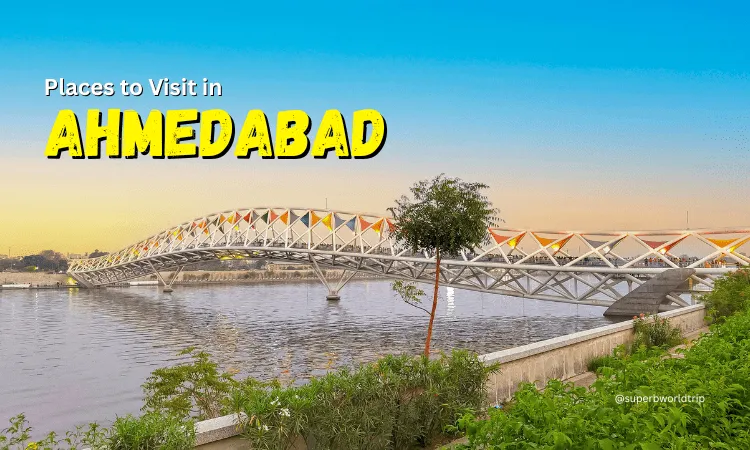10 Top Places to Visit in Ahmedabad with SuperbWorldTrip

When you think of Gujarat, what often comes to mind are vibrant festivals, colorful textiles, delicious food, and centuries-old history.
And at the heart of it all lies Ahmedabad, a city that perfectly captures the soul of the state. Resting on the banks of the Sabarmati River, Ahmedabad is not just a bustling metropolis—it is the first UNESCO World Heritage City in India.
This recognition was not given lightly; it’s a testament to the city’s ability to preserve its architectural heritage, culture, and traditions while still moving forward with modern development.
From Mughal-era mosques and stepwells to lively bazaars and world-class museums, Ahmedabad is a destination where every traveler finds something to fall in love with.
The city is a living example of how history and modernity can beautifully co-exist. Whether you’re a history buff, a foodie, an architecture enthusiast, or someone traveling with family, Ahmedabad will surprise you with its diversity.
At SuperbWorldTrip, we design itineraries that let you experience Ahmedabad beyond the usual “tourist checklist.” We encourage you to walk through its bustling pols (old neighborhoods), taste authentic Gujarati snacks at night markets, sit by the Sabarmati Riverfront during sunset, and dive deep into its fascinating textile heritage.
Let’s take you through the top 10 must-visit attractions in Ahmedabad—each with its own story, charm, and cultural significance.
1. Sabarmati Ashram – Gandhi’s Peaceful Abode
No trip to Ahmedabad is complete without visiting the Sabarmati Ashram, the former home of Mahatma Gandhi.
This is where Gandhi lived for nearly 12 years and led India’s freedom struggle through principles of non-violence and truth. The ashram still preserves his personal belongings, including letters, photographs, and his iconic spinning wheel (charkha).
- Why visit? It offers a calm and reflective environment where you can understand Gandhi’s philosophy and India’s freedom journey.
- Best time: Year-round, especially mornings for a quieter experience.
- Things to do: Explore Hriday Kunj (Gandhi’s cottage), visit the Gandhi Smarak Sangrahalaya (museum), and take a peaceful walk along the Sabarmati Riverfront.
Travel Tip: Don’t rush through. Spend at least 2–3 hours here to absorb the serenity. Many travelers find it to be one of the most meaningful stops in Ahmedabad.
2. Adalaj Stepwell – An Architectural Marvel
Built in 1499, the Adalaj Stepwell (Adalaj ni Vav) is one of the most stunning stepwells in India.
Stepwells were designed not only as water reservoirs but also as cool resting places during Gujarat’s hot summers. The Indo-Islamic carvings here—floral patterns, mythological figures, and geometrical designs—are masterpieces in stone.
- Why visit? A rare combination of utility and beauty, showcasing Gujarat’s ancient engineering.
- Best time: October to March, when the weather is pleasant.
- Things to do: Admire the intricate carvings, click photographs of the light-and-shadow play inside the well, and learn about the legends associated with its construction.
Travel Tip: Hire a local guide to hear the fascinating story of Queen Rudabai, who commissioned the stepwell.
3. Sidi Saiyyed Mosque – The Icon of Ahmedabad
If there’s one image that represents Ahmedabad, it’s the Sidi Saiyyed Mosque, built in 1573. The mosque is famous for its stone lattice windows (jalis), especially the iconic “Tree of Life” motif. This fine filigree carving has become the unofficial symbol of the city.
- Why visit? To see one of the finest examples of stone craftsmanship in India.
- Best time: Year-round. Evenings are beautiful when the jalis are lit up from inside.
- Things to do: Marvel at the craftsmanship, take photographs, and visit nearby eateries for some authentic snacks.
Travel Tip: Combine your visit with a heritage walk through old Ahmedabad’s pols.
4. Jama Masjid – Grandeur Meets Spirituality
Constructed in 1424 by Sultan Ahmed Shah (the founder of Ahmedabad), Jama Masjid is one of the most impressive mosques in India. Built with yellow sandstone, it has a vast courtyard and intricately carved columns.
- Why visit? For its sheer scale, beauty, and spiritual atmosphere.
- Best time: Year-round, especially early mornings.
- Things to do: Attend morning prayers, explore the adjoining markets, and take time to sit in the courtyard for quiet reflection.
Travel Tip: Dress modestly and be respectful of prayer times.
5. Kankaria Lake – Family Fun Spot
Originally built in the 15th century, Kankaria Lake is now one of the most vibrant recreational hubs in the city. With gardens, toy trains, a zoo, and evening light shows, it’s perfect for families. Every December, the lake hosts the famous Kankaria Carnival, a week-long festival of music, dance, and culture.
- Why visit? To enjoy leisure activities and experience the carnival-like atmosphere.
- Best time: November to February.
- Things to do: Try boating, enjoy the light show, visit the zoo, or simply stroll around in the evening breeze.
Travel Tip: Go in the evening when the lake is beautifully lit up and food stalls are active.
6. Calico Museum of Textiles – A Cultural Gem
For anyone interested in art and culture, the Calico Museum of Textiles is unmissable. It houses one of the world’s most important collections of Indian textiles, ranging from Mughal-era fabrics to tribal weaves.
- Why visit? To understand India’s textile tradition and Ahmedabad’s role as a textile hub.
- Best time: Year-round, but entry is strictly by prior booking.
- Things to do: Take a guided tour, explore galleries showcasing intricate embroidery and ancient fabrics, and learn about weaving traditions.
Travel Tip: Photography is not allowed inside, so just soak in the visual beauty.
7. Manek Chowk – Street Food Paradise
In the morning, Manek Chowk functions as a bustling jewelry market. But as night falls, it transforms into Ahmedabad’s most popular food street. From pav bhaji to dosa, kulfi to chocolate sandwiches, you’ll find endless variety here.
- Why visit? To taste authentic Gujarati snacks and late-night treats.
- Best time: Evenings and nights, especially in winter.
- Things to do: Try local favorites like khaman, kulfi, and ghee-laden pav bhaji.
Travel Tip: Arrive hungry and try small portions from multiple vendors—it’s all about variety.
8. Teen Darwaza – Gateway of History
Built in 1411, Teen Darwaza is one of the oldest gateways of Ahmedabad. Once the royal entrance to the city, it now stands amidst bustling markets.
- Why visit? A perfect blend of history and daily life.
- Best time: Year-round.
- Things to do: Explore nearby bazaars, shop for handicrafts, and click photographs of the grand arches.
Travel Tip: The nearby markets are great for bargain shopping.
9. Sabarmati Riverfront – Modern Ahmedabad
The Sabarmati Riverfront has completely transformed the city’s vibe. This 11-kilometer stretch along the river is perfect for cycling, jogging, or simply enjoying the sunset. Cultural festivals and fairs are often held here.
- Why visit? It’s modern, clean, and lively—a refreshing contrast to heritage sites.
- Best time: October to March, evenings especially.
- Things to do: Take a boat ride, rent a bicycle, or attend the International Kite Festival in January.
Travel Tip: Sunset views here are magical—carry your camera.
10. Bhadra Fort & Market – History Meets Shopping
Built in 1411 by Sultan Ahmed Shah, Bhadra Fort is surrounded by vibrant markets. Inside, you’ll find palaces, mosques, and an old clock tower. The nearby market is a paradise for textiles, handicrafts, and jewelry.
- Why visit? A great spot to combine heritage exploration with shopping.
- Best time: Year-round.
- Things to do: Shop for souvenirs, admire Mughal architecture, and explore local eateries.
Travel Tip: Go during weekdays to avoid heavy crowds.
How SuperbWorldTrip Makes Your Ahmedabad Experience Better
At SuperbWorldTrip, we don’t just take you from one monument to another—we curate immersive experiences. Whether it’s a guided food walk at Manek Chowk, a storytelling session at Adalaj Stepwell, or a textile tour at Calico Museum, we ensure your Ahmedabad trip is memorable and meaningful.
Our itineraries are designed to balance heritage, food, culture, and leisure so that every traveler, whether solo, with family, or in groups, enjoys Ahmedabad at its best.
11. Swaminarayan Akshardham Temple (Gandhinagar) – Spiritual Grandeur
Located about 25 km from Ahmedabad, the Akshardham Temple in Gandhinagar is one of Gujarat’s most iconic spiritual landmarks. Dedicated to Lord Swaminarayan, the temple is renowned for its intricate pink sandstone carvings, cultural exhibitions, and the spectacular Sahaj Anand Water Show that beautifully combines light, sound, and storytelling.
- Why visit? For its architectural magnificence, spiritual environment, and immersive exhibitions.
- Best time: Evenings are ideal to enjoy the water show.
- Things to do: Explore exhibitions, admire temple carvings, attend the musical fountain show.
Travel Tip: Allocate at least half a day—this is not just a temple but a cultural experience.
12. Hutheesing Jain Temple – Marble Beauty
Built in 1848, the Hutheesing Jain Temple is a masterpiece in marble architecture. Dedicated to the 15th Jain Tirthankara, Dharmanatha, the temple is adorned with finely carved marble columns, domes, and shrines.
- Why visit? It’s one of the most important Jain temples in Ahmedabad with stunning craftsmanship.
- Best time: Morning hours for peaceful visits.
- Things to do: Admire carvings, explore shrines, and sit quietly for spiritual reflection.
Travel Tip: Dress modestly and maintain silence inside.
13. Science City – Learning with Fun
For families and students, Science City is a must-visit. Spread across acres, it offers an IMAX 3D theatre, planetarium, robotics gallery, and exhibitions that make science interactive and fun.
- Why visit? It combines education with entertainment.
- Best time: Year-round, but winter afternoons are perfect.
- Things to do: Watch a 3D show, visit the aquarium, explore the energy park.
Travel Tip: Plan at least 3–4 hours here—it’s huge and full of activities.
14. Sardar Vallabhbhai Patel National Memorial – Tribute to the Iron Man
Set inside the historic Moti Shahi Mahal, this museum is dedicated to Sardar Vallabhbhai Patel, one of India’s greatest leaders. Exhibits here showcase his life, contributions to India’s independence, and role in unifying the nation.
- Why visit? To understand the life of a national icon.
- Best time: Year-round.
- Things to do: Walk through galleries, view multimedia exhibits, and explore the palace gardens.
Travel Tip: A guided tour helps you appreciate Patel’s vision better.
15. Vaishnodevi Temple – A Devotional Replica
Situated on the Ahmedabad–Gandhinagar Highway, the Vaishnodevi Temple is a smaller replica of the famous shrine in Jammu. It attracts countless devotees who come here for blessings without traveling north.
- Why visit? To experience devotion and temple architecture.
- Best time: Festivals like Navratri.
- Things to do: Climb up to the shrine, participate in prayers, and explore nearby eateries.
Travel Tip: Expect crowds during weekends and festivals.
16. ISKCON Temple Ahmedabad – Krishna’s Abode
The ISKCON Temple in Ahmedabad is a serene spiritual retreat. With its beautiful white-marble architecture, devotional chants, and peaceful atmosphere, it is an excellent place to relax spiritually.
- Why visit? For its devotional ambiance and spiritual activities.
- Best time: Evening aarti (prayer ceremony).
- Things to do: Attend aarti, join kirtan sessions, and enjoy prasadam.
Travel Tip: The temple also has a vegetarian restaurant serving sattvic food.
17. Sanskar Kendra (City Museum) – Designed by Le Corbusier
This unique museum, designed by renowned French architect Le Corbusier, showcases Ahmedabad’s history, art, and culture. It’s an architectural gem in itself and offers a glimpse into the city’s evolution.
- Why visit? For its design and cultural exhibits.
- Best time: Year-round.
- Things to do: Explore galleries featuring Ahmedabad’s traditions and photographs of old city life.
Travel Tip: Architecture students will especially love this museum.
18. Shreyas Folk Museum – Folk Traditions Preserved
The Shreyas Folk Museum is dedicated to Gujarat’s folk art and tribal culture. From traditional costumes and jewelry to puppets and crafts, the museum preserves Gujarat’s living traditions.
- Why visit? It’s one of the best places to understand Gujarat’s folk heritage.
- Best time: Year-round.
- Things to do: Explore displays of tribal artifacts, textiles, and handicrafts.
Travel Tip: It’s slightly away from the city center, so plan transport in advance.
FAQs on Ahmedabad
Q1. What is the reason Ahmedabad well-known?
Ahmedabad is the first Indian UNESCO World Heritage City, recognized for its historical places, Gandhi’s ashram, stepwells, and vibrant food culture.
Q2. What is the most suitable time to go to Ahmedabad?
From October to March is the perfect time for warm temperatures and festivals like Uttarayan (kite celebration).
Q3. How many days is enough to get Ahmedabad?
The time of 2-3 days is ideal to visit major tourist attractions as well as food establishments and close heritage sites.
Q4. What are the most popular eateries in Ahmedabad?
Manek Chowk, Law Garden Night Market as well as local Thali restaurants.
Q5. What can SuperbWorldTrip help me make my Ahmedabad trip more enjoyable?
We have curated stress-free itineraries that include carefully selected accommodation, guided tours and local excursions so that you are able to enjoy Ahmedabad without sacrificing the essence of it.
Final Thoughts
Ahmedabad is not just a city—it’s an experience. From the peaceful Sabarmati Ashram to the lively food stalls of Manek Chowk, from centuries-old stepwells to modern riverfront promenades, from iconic temples to interactive museums, it offers something for every traveler. With SuperbWorldTrip, your journey to Ahmedabad goes beyond sightseeing—it becomes a story of culture, taste, and unforgettable memories.
Latest Post
Best Places to Visit Near Raipur: Top Tourist Destinations for a Perfect Getaway
Top Places to Visit in Gwalior: A Complete Travel Guide (2025)
Top Places to Visit in Hampi: A Complete Travel Guide (2025)
Top Places to Visit in Surat: A Complete Travel Guide for 2025
Best Places to Visit in January in India – Winter Travel Guide 2025
Places to Visit in Ujjain: A Complete Travel Guide for 2025
Best Places to Visit in Winter in India: A Complete Travel Guide for 2025
Top Places to Visit in Jodhpur – Ultimate Travel Guide 2025
Best Things To Do In Araku Valley – A Complete Travel Guide (2025)
Best Places to Go in Chikmagalur The Complete Guide to Travel Guide
Best 15 things you can do while in Phuket, Thailand—Your Ultimate Travel Guide
Top 20 Things to do in Coimbatore The Complete Travel Guide
What to See and Do In Gokarna A Comprehensive Travel Handbook for the First-Time Visitor
Things to do in Ooty: The top attractions, activities and the Travel Guide
Gulmarg: India’s Most-Searched Winter Destination – A Comprehensive Travel Guide by SuperbWorldTrip

Phuket, Thailand’s Largest Island, is an Idyllic Tropical Destination

Places to Visit in Bhutan: Journey into the Land of Happiness

Jhansi: the Historical Heart of Bundelkhand

Attractions to Visit in Kutch – Exploring Gujarat
